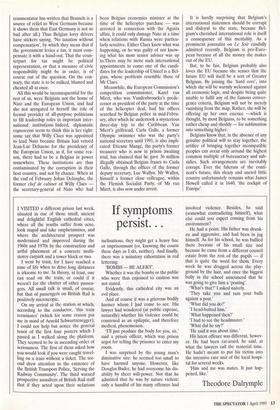If symptoms persist.. .
I VISITED a different prison last week, situated in one of those small, ancient and delightful English cathedral cities, where all the youths suffer from acne, look stupid and take amphetamines, and where the architectural prospect was modernised and improved during the 1960s and 1970s by the construction and artful placement of a concrete multi- storey carpark and a tower block or two.
I went by train, for I have reached a time of life when to drive long distances is irksome to me. In theory, at least, one can read on the train, or could if it weren't for the chatter of other passen- gers. All small talk is small, of course, but that of passengers on British Rail is positively microscopic.
On my arrival at the station at which, according to the conductor, 'this train terminates' (which for some reason put me in mind of Arnold Schwartzenegger), I could not help but notice the general tenor of the first four posters which I passed as I walked along the platform. They seemed to be in ascending order of seriousness. The first of them asked how you would look if you were caught travel- ling on a train without a ticket. The sec- ond drew attention to the existence of the British Transport Police, 'Serving the Railway Community'. The third warned prospective assaulters of British Rail staff that if they acted upon their nefarious inclinations, they might get a heavy fine or imprisonment (or, knowing the courts these days as I do, neither). And finally, there was a minatory exhortation in red lettering: `BOMBS — BE ALERT'.
Whether it was the bombs or the public who were thus enjoined to caution was not stated.
Evidently, this cathedral city was an evil place. And of course it was a grievous bodily harmer whom I bad come to see. His lawyer had wondered (at public expense, naturally) whether his violence could be construed as an epileptic, and therefore medical, phenomenon..
`I'll just produce the body for you, sir,' said a prison officer, which was prison argot for telling the' prisoner to enter my
S00111.
I was surprised by the young man's diminutive size: he seemed too small to have harmed anyone. However, like Douglas Bader, he had overcome his dis- ability by sheer will-power. Not that he admitted that he was by nature violent: only a handful of his many offences had involved violence. Besides, he said (somewhat contradicting himself), what else could you expect coming from his environment?
He had a point. His father was drunk- en and aggressive, and had been in jug himself. As for his school, he was bullied there because of his small size and because he came from a different council estate from the rest of the pupils — if that is quite the word for them. Every week he was dragged across the play- ground by the hair, and once the biggest bully in the school announced that he was going to give him a 'posting'.
`What's that?' I asked naively.
`They take you and ram your balls against a post.'
`What did you do?'
`I head-butted him.'
`What happened then?'
`I had to see the headmaster.'
`What did he say?'
`He said it was about time.'
His latest offence was different, howev- er. He had been rat-arsed, he said, at what the lawyers call the material time. He hadn't meant to put his victim into the intensive care unit of the local hospi- tal for several weeks.
`Him and me was mates. It just hap- pened, like.'
Theodore Dalrymple


























































 Previous page
Previous page